Xgimi Horizon S Max review
XGIMI is a market leader in smart projectors and is stirring up the high-end segment with its Horizon series. The S Max aims to shine with its quadruple laser delivering over 3000 genuine lumens, and impresses in HDR with Dolby Vision and IMAX Enhanced.
Xgimi is launching two new S-Class projectors that mainly differ in brightness and price. The Horizon S Max is said to deliver an enormous 3100 ISO lumens, while its identically looking brother, the Horizon S Pro, still puts a remarkable 1800 lumens onto the screen.
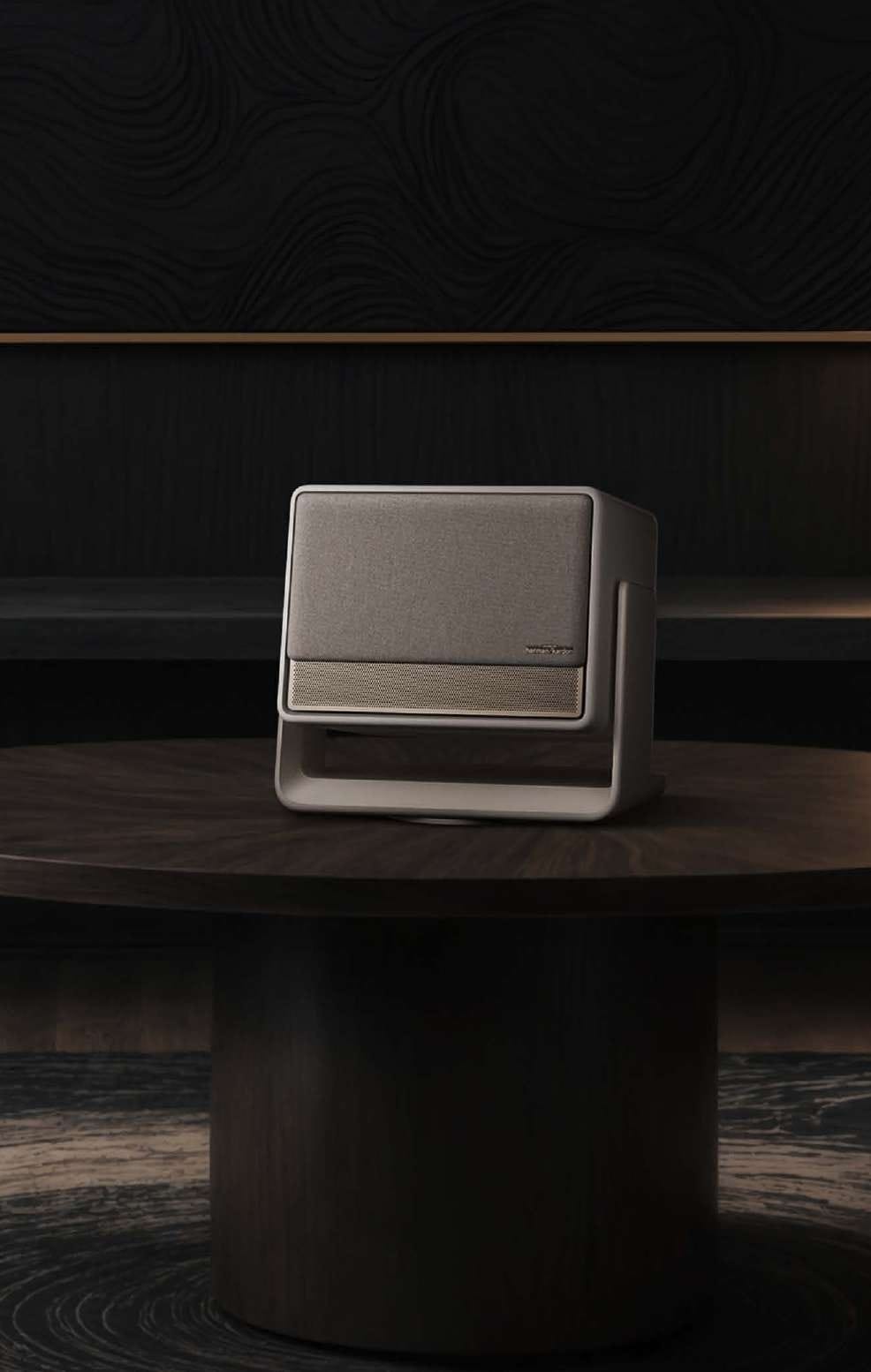
For our test, we had a development sample of the S Max, which had not yet reached its final brightness and software state, and we were thrilled—despite or perhaps because of our almost 30 years of home theater testing experience. The Xgimi projector is one of the first devices whose contrast and color potential truly provide enjoyment even with the most demanding HDR image sources. While the predecessor, Horizon Ultra, disappointed with native and in-picture contrast values below 1:300 despite an integrated iris, Xgimi has now almost quintupled the quality of the black levels.
And in combination with the enormous color space of the new quadruple laser, it can outshine even some full-grown high-end projectors for over $5000 when showing HDR content.
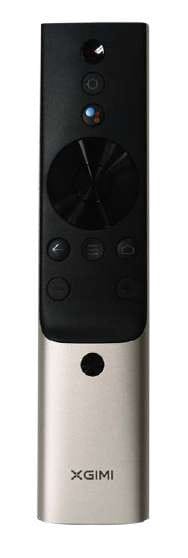
However, let’s mention the downside right away: The highly light-transmissive optics are achieved with fewer lenses, as neither optical zoom nor lens shift is supported. Therefore, the projector must be placed exactly at a distance of 1.23 times the desired image width, either in front of or behind the screen, roughly at the height of the screen’s lower or upper edge. If this is done correctly, you’ll be rewarded with fabulous Ultra HD sharpness, which is rarely seen so detailed on DLP projectors.
However, a certain hotspot effect cannot be denied. The image is brightest in the middle at the bottom and loses some color sharpness towards the upper corners. Due to the very long-wave red laser chosen, color shifts (chromatic aberrations) in the outer areas of the optics are unavoidable.
Far Too Good for Its Price?
We approach tests and measurements with ambitious home cinema demands, but the target group or application area of the Horizon-S devices is indeed broader. They can be set up extremely quickly and, thanks to the integrated foot that can rotate 360° and tilt 135°, they can be perfectly aligned. An automatic keystone correction and autofocus are triggered immediately.
Furthermore, the projector can even recognize obstructive objects such as pictures on the wall or lamps on the ceiling and adjust the projection area accordingly. It can even compensate for wall color so that a tinted background doesn’t distort the colors of the image. Since all of this, including zooming, is done electronically, a bit of sharpness and brightness is lost during these adjustments. Still, it’s really cool to quickly project the Horizon onto the bedroom ceiling. The Xgimi Wall app, which conjures up moving party atmospheres, nature, airplane, or even space scenarios on the walls, is also quite a spectacle.
As demanding HDR movie fans, we preferred to align the device perfectly with our Stewart screens during measurements and tests, without using geometric corrections.
A Smart All-in-One Device
Upon first switching it on, Android TV 11 is set up, which can be done quickly and easily using a smartphone. The operating system runs on a moderately fast quad-core A55 chip (1.5 GHz) and 2 GB RAM, but offers a generous 48 GB of free storage. You can fill it with all sorts of apps, and thanks to Google’s universality, almost everything important for the U.S. market is available. As one might suspect, there were issues with the Netflix license, so we had to use a known workaround that then only provided the service without 4K or HDR. It remains to be seen if Netflix will be supported at market launch—some Xgimi devices already can. We tested with Prime, Disney, WOW, Maxdome, Paramount, and Apple, and watched TV with Magenta-TV. With Chromecast, DLNA, and USB playback, the Xgimi also offers plenty of source options. Its HDMI input is version 2.0 (18 Gbit/s), so it tops out at 4K@60fps. There are no variable frame rates for gaming, but at least ALLM is available for automatic gaming mode selection, reducing latency from 143 to 36 milliseconds.
Enthusiastically MAXimal Color Brilliance
Now we know what can be fed into the device, but the most interesting part is what comes out of the front of the elegant housing after the Max powers on within just six seconds, and the fabric-covered protective cover in front of the lens moves down. We weren’t surprised that we were first greeted by extremely brilliant, very cool, and oversaturated colors of oversharpened image objects. This is common in the Asian market and appears very fresh and crisp.
The fact that the Film mode offers a decent color temperature (white balance) but has significantly increased color gamut (vividness of saturated tones) and sharpness does not have to be the case, especially since you cannot correct these preset modes in that regard. The solution is quickly found, however: in User mode, everything can be wonderfully calibrated if you know how. If you also select the “Color Accuracy” option at a professional level, you’ll actually see the User mode from the factory as it should be for professional standards. With Delta values of 2 to 3 on a 10-point scale, you can speak of unusually natural color reproduction in HDTV.



Regarding HDR: Dolby Vision is processed properly, and conveniently you can pre-select the screen size, after which the device adjusts the brilliance and its clipping curve. Great! Normal HDR was incorrectly always recognized as IMAX Enhanced, but this was actually an advantage because only then did the projector also activate the extended (BT.2020) color space for HDR. The developers are working to fix such bugs. As mentioned, we tested a non-final device.
We played a lot with the sophisticated color reproduction options and achieved wonderful effects. For example, the Dual Light 2.0 light engine, which adds a fourth (LED) light source with a broad yellow spectrum to avoid speckle, can be switched to three-laser operation. This results in slightly less light output but an ultra-saturated green (the BT.2020 color space grows from 90% to 96%!). The automatic iris never disturbed the movie experience and achieved a significantly improved black level in dark scenes with only a 10% reduction in brightness.

Considering the native contrast of 570:1 (in-picture 1400:1), one can almost believe Xgimi is using an improved version of the DLP micro-mirror chip, so rich and brilliant does the image appear on our three-meter-wide screen. We have not seen such a convincing HDR color reproduction from any projector under $5000—if you choose the right settings. It would be desirable to slightly improve these presets and the factory HDR automations. Dolby Vision already works well, but having the projector independently adapt the normal HDR to the metadata and analyzed image maxima would be the icing on the cake. In our tests, the light sensor for adjusting to room brightness did not work at all yet.
The Third and Fourth Dimension
On a positive note, the new Horizon also supports 3D, still sought after by many home cinema fans, naturally only with an additional DLP-Link glasses. However, as demanding home cinema enthusiasts, we were not fully convinced by the motion representation. The Xgimi works with a fixed 60 frames per second. For 24p film material, it displays one film frame twice, then the next three times. This 2:3 pulldown has been standard in 60 Hz countries since NTSC times, and people there have gotten used to the judder. We, however, welcome an unaltered 24p motion at 48 or 120 Hz, as most TV sets and good projectors show in film mode.
The Xgimi projector also converts our 50 Hz TV signal to 60 Hz by repeating every fifth frame. This again causes slight judder. To avoid it, an excellently functioning frame interpolation for motion smoothing is integrated, but that, per se, alters the pure film look. The important fact is that most—especially smart—projectors do the same, though many testers and influencers don’t notice it negatively. And the dreaded rainbow artifacts of DLP technology are just as absent as false contour effects. The reason is the ultra-fast switching of laser colors in the RGRGB rhythm, almost 1000 times per second.
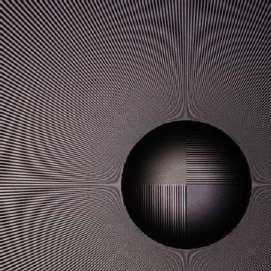
By the way, the Xgimi has audio playback developed with Harman Kardon. The forward-facing 2×12-watt system reaches pleasantly deep into the bass range, sounds quite harmonious for music, and not overly sharp. It handles DTS as well as Dolby Audio, providing decent virtual spaciousness in films. Very commendable is that it does not have to drown out the built-in cooling fan, which runs very quietly.

From the Test Lab
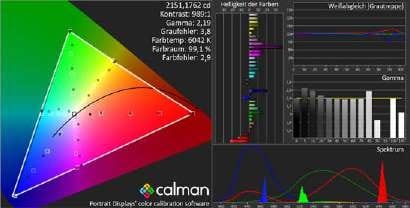
HDTV Full HD BT.709 8-bit Image Measurement
The Max offers a professionally preset picture mode that delivers extremely natural colors—and that with over 2000 genuine lumens and an outstanding contrast range.
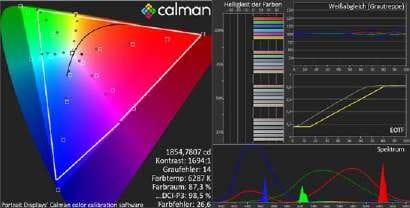
Ultra HD HDR BT.2100 12-bit Image Measurement
In HDR, IMAX Enhanced is activated, and the color space extends almost to the standardized upper limit—even better in three-laser mode than shown here.
XGIMI Horizon S Max Specifications
- Manufacturer: XGIMI
- Model: Horizon S Max
- Class: 4K Projector
- Dimensions (W × H × D): 28 × 24 × 16 cm
- Weight: 4.9 kg
- Resolution / Aspect Ratio: 3840 × 2160 / 16:9
- Color Coverage:
- HDTV: 100%
- HDR: 90% (96% in 3-laser mode)
- Contrast:
- ISO: 568:1
- In-picture: 1405:1
- Dynamic: 1766:1
- Black Level: 1:1907 (Standard) / 1:692 (Eco mode)
- Brightness: 6454 K (Color temperature)
- Latency (Gaming mode): 36 ms
- Connectivity:
- HDMI: 1 port
- USB: 2 ports
- Network: Not supported
- Wi-Fi 5, Bluetooth 5.1, External power supply
Features
- HDR Formats: Dolby Vision (DV), Hybrid Log Gamma (HLG)
- 3D Support: Yes (DLP-Link glasses required)
- Smart Remote Control: Microphone-enabled
- Motion Compensation: Supported
- Image Adjustment Options:
- Saturation and Tint: Adjustable
- Sharpness and Gamma: Adjustable
- RGB Offset / Gain: Adjustable (+11 points for color accuracy)
- Light Adjustment: Iris and light sensor
- Auto-Focus: Supported
- Zoom / Lens Shift: Not supported
Verdict
Thanks to a brilliant contrast and rich laser colors, the Horizon S Max sets new standards in HDR projection. The smart all-in-one device provides a lot of fun in many situations due to its universally quick setup.
Pros:
- Vibrant colors through 3 lasers
- Excellent contrast
- Dolby Vision and IMAX Enhanced
- Android 11 Smart TV
- Outstanding color potential
- Autofocus and keystone correction
Cons:
- No zoom, no lens shift
- Few connection options
- Overly aggressive image presets
Score: Very Good (520 points)
Test Results
Image Quality (Max: 10)
- SD / HDTV: 7.5 / 10
- UHD (HDR): 8.5 / 10
- Contrast: 7.5 / 10
- Geometry / 3D: 8 / 10
- Color Representation: 8.5 / 10
- Image Stability: 8.5 / 10
Features (Max: 10)
- Connectivity / HDMI: 7.5 / 10
- Projection Optics: 5.5 / 10
- Additional Features: 7.5 / 10
Usability (Max: 10)
- Adjustability: 8 / 10
- Ergonomics: 8.5 / 10
- Image Control: 7 / 10
- Remote Control: 7.5 / 10
Build Quality (Max: 10)
- Design / Aesthetics: 9.5 / 10
- Materials: 8.5 / 10
Final Verdict
- Score: 8.7 / 10 (520 out of 650 points)
- Rating: Very Good
When you purchase through links on our site, I may earn an affiliate commission. Here’s how it works.
XGIMI Horizon S Max Review - A Premium 4K Laser Projector
XGIMI Horizon S Max Review - A Premium 4K Laser Projector US store: ...










